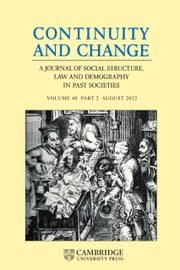Article contents
Enforcing agreements: notaries and courts in early modern Rome
Published online by Cambridge University Press: 01 August 1999
Abstract
In an article which recently appeared in Social History, Craig Muldrew has argued that ‘the culture of the early modern market was explicitly “moral” and not only in “severely dysfunctional years”“. During the sixteenth century, population growth brought with it a shortage of currency and a significant increase in trade through barter; moreover, the scarcity of currency produced an increase in debt or credit relations, which were based mostly on agreements that were verbal rather than written. Both tendencies were possible because the parties to credit agreements knew each other personally, and consequently believed that they could trust each other; thus, the system was held together by confidence and trust. In the course of the century, however, the increasing complexity of the market and the enlargement of exchange areas placed a strain on the ethical foundations of the market. The alteration can be demonstrated by the rapid increase in litigation over contracts and debts. Muldrew argued that markets expanded due to population growth in the sixteenth century, and that ‘increasingly complex networks of credit transactions were created’ with the result that ‘the need to maintain trust … [was] emphasized even more strongly’. But during the period the maintenance of trust occurred more and more through the intervention of a legal tribunal, while the cultural norms that directed creditor–debtor relations altered.
According to Muldrew, without more complex arrangements, credit transactions can spread only in limited social environments in which the participants share some basic moral principles: people know one another, they know who can be trusted and who cannot, and they grant extensions for payments from others because at times they request them for themselves. Credit relationships are thus ‘embedded’ in a moral economy that relies on trust, and which rests on respect for agreements guaranteed by the logic of reciprocity. A growth in the number of transactions and the development of credit networks, together with the fact that these agreements are mostly oral ones, however, tends to undermine the traditional system of trust, forcing the parties to turn to civil justice more and more frequently.
On the basis of the records from Roman archives (where commercial development occurred early but in a milieu in which the papacy influenced the economic culture), this study aims to show that the extension and the very existence of credit networks have to be viewed not only in the context of currency scarcity but also with regard to the peculiarities of the pre-industrial economy. To be more precise, in early pre-consumer societies where transactions were largely unwritten, litigation occurred as a way of establishing the terms of transactions.
- Type
- Research Article
- Information
- Copyright
- © 1999 Cambridge University Press
- 7
- Cited by




